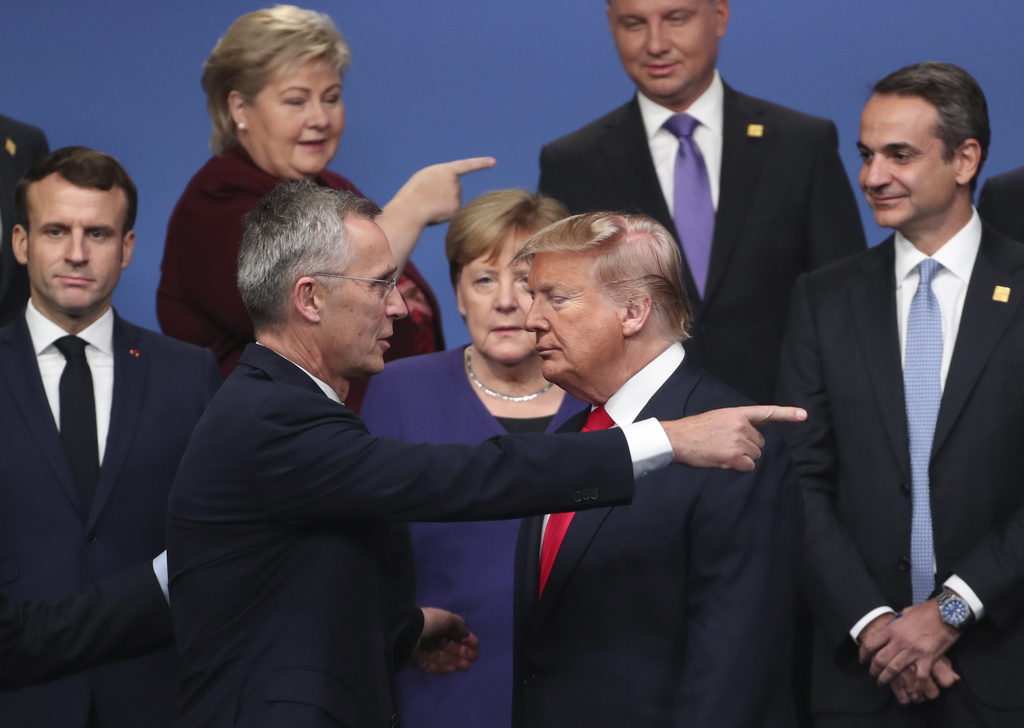Former President Donald Trump put U.S. troops “in greater danger” by suggesting that he might encourage Russia to attack some European allies, according to the U.S. envoy to NATO.
“Well, look, encouraging the Kremlin to attack any NATO ally or alliance territory really puts our soldiers, U.S. soldiers, and our allies’ soldiers in greater danger,” Ambassador to NATO Julianne Smith told reporters Tuesday. “Doing so, making those types of statements, is dangerous and, frankly, irresponsible.”
Smith offered that rebuke amid a series of queries prompted by Trump’s latest rhetorical blast of European allies that fail to spend adequately on defense, including one blunt question about whether European members of NATO need to develop “a spinoff” alliance in the event of a Trump victory in November. Smith’s briefing, billed as a preview of the meeting of NATO defense ministers in Brussels, amounted to a preview of the tenor of conversations that will await U.S. diplomats and defense officials during a series of high-profile meetings this week.
“We’ve seen nine years of consecutive increases in the defense spending among our allies, and we’re going to be celebrating that at the summit this summer in Washington,” Smith said in a separate appearance on CNN’s This Morning. “So, in 2014, we had three allies here inside the alliance that were spending 2% of GDP on their national defense. This year at the summit, we think we’re going to be close to two-thirds of the alliance spending 2% of their GDP on defense. So, that is leaps and bounds from where we started.”
Smith credited Trump and the Democratic presidents who preceded and succeeded him with driving that change. NATO Secretary General Jens Stoltenberg, who likewise acknowledged that Trump “had an impact” on defense spending across the alliance, said that this year, he expects “at least half of the Allies to meet the [defense spending] target” set by NATO leaders at a 2014 summit.
“That’s not good enough, but it’s enormously much better than when we made the pledge,” Stoltenberg said in January. “So I’m actually quite optimistic when it comes to NATO allies delivering, and that’s my main message to the United States: That European allies have understood the seriousness and European allies are investing more.
As Secretary of State Antony Blinken prepares for a swing through Europe that will include a stop at the Munich Security Conference, an annual assembly of trans-Atlantic powerbrokers and geopolitical tastemakers, a senior State Department official suggested that Trump might have been “expressing his pride that he brought increased investment into the national defense of our allies,” in contrast to more invidious interpretations.
“Even when America has come close to adopting isolationist sentiments, we have always come back to this leadership role,” State Department Assistant Secretary James C. O’Brien, who leads the Bureau of European and Eurasian Affairs, told reporters Tuesday. “That’s the purpose of an alliance — that you know you can count on each other, whatever the headlines are.”
The headlines in recent days have carried alarming summaries of Trump’s remarks at a campaign rally in South Carolina.

“One of the presidents of a big country stood up and said, ‘Well, sir, if we don’t pay and we’re attacked by Russia, will you protect us?’” Trump said Saturday. “I said, ‘You didn’t pay, you’re delinquent?’ He said, ‘Yes.’ Let’s say that happened. No, I would not protect you. In fact, I would encourage them to do whatever the hell they want.”
O’Brien’s outline of alternative readings of those remarks extends a recent genre of U.S. diplomats playing the part of interpreter for allied officials alarmed by Trump’s comments. President Joe Biden, for his part, offered a starker reading of his 2024 rival’s remarks.
“Just a few days ago, Trump gave an invitation to Putin to invade some of our allies, NATO allies,” Biden said Tuesday afternoon. “The worst thing is, he means it … For God’s sake, it’s dumb, it’s shameful, it’s dangerous. It’s un-American. When America gives its word, it means something, so when we make a commitment, we keep it.”
CLICK HERE TO READ MORE FROM THE WASHINGTON EXAMINER
If Biden’s rhetoric is aimed at a domestic audience amid a presidential election season, the electoral context seems likely to tinge the interpretation of Blinken’s rhetoric in Europe.
“He’s going to make the case that the President made: That as long as Joe Biden is president, we will continue to support NATO, we will continue to support our European allies, and we will continue to stand with Ukraine,” State Department spokesman Matthew Miller told reporters Tuesday. “One of the hallmarks of this country is our enduring bipartisan support for NATO. … There is broad, widespread support from the American people for NATO. There is also broad, widespread support for NATO in Congress, and we expect that support to continue.”
